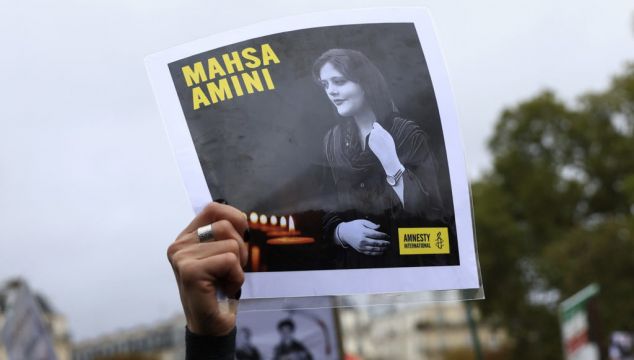Iran has published video showing two detained French citizens purportedly confessing to acts of espionage.
It came as Iranian leaders sought to portray ongoing anti-government protests as a foreign plot instead of widespread anger over the death of a 22-year-old Iranian woman detained by the country’s morality police.
The video released by the state-run IRNA news agency showed a woman presented as Cecile Kohler, a high school teacher and educational trade union official, alongside her partner, Jacques Paris.
France’s government issued a rebuke to the allegations and described the plight of the detained French citizens as “state hostages”.
Iran has offered no public evidence to support the spying accusations.
The French Foreign Ministry said the “supposed confessions extracted under duress” of the detained French nationals in the video was “outrageous”.
“This masquerade reveals the contempt for human dignity that characterises the Iranian authorities,” the ministry said in a statement.
It said other French citizens are also being arbitrarily held in Iran, without naming them.
The European Union adopted a resolution on Thursday calling for sanctions against those responsible for the death of Mahsa Amini in the custody of Iran’s morality police, and the Islamic Republic’s subsequent crackdown on anti-government protests.
The resolution, adopted by a show of hands, urges the 27-nation bloc to sanction Iranian officials and called for an investigation into Ms Amini’s death.
“Parliament strongly condemns the widespread and disproportionate use of force by Iranian security forces against the crowds,” the resolution said in part.
Members also demanded that Iran “immediately and unconditionally release and drop any charges against anyone who has been imprisoned solely for exercising their rights to freedom of expression, association and peaceful assembly, as well as all other human rights defenders”.

The outpouring of anger in Iran — largely led by young women and directed at the government’s male leadership — has created a seminal moment for the country, spurring some of the largest and boldest protests against the country’s Islamic leadership seen in years.
The clips on Thursday resembled other videos of confessions Tehran has forced prisoners to make. In 2020, one report suggested authorities over the last decade had aired at least 355 coerced confessions.
In the clips, Ms Kohler wears a headscarf and purportedly describes herself as an “intelligence and operation agent of French foreign security service”. Mr Paris purportedly says: “Our goals in the French foreign security service is to put pressure on Iran’s government.”
The clips are part of what is described as a forthcoming documentary to air on Iranian state television that will accuse them of bringing cash to the country to stir dissent.
France did not immediately respond to the release of the video clips. However, in May the French government demanded their release and condemned “these baseless arrests.”
Their visit to Iran coincides with months of protests by teachers for higher wages in the country.
Any sanctions by the EU would fall under the bloc’s Global Human Rights Sanctions Regime. It was set up two years ago so the bloc can “target individuals, entities and bodies – including state and non-state actors – responsible for, involved in or associated with serious human rights violations and abuses worldwide”.
Other human rights violations or abuses can be included “if they are widespread, systematic or otherwise of serious concern”.
These measures usually consist of travel bans and asset freezes on officials accused of involvement in any suspect abuses or “entities,” like banks, companies, agencies or other organisations. It prevents EU citizens from making funds available to those listed.
On Thursday the US imposed more sanctions on Iranian government officials in response to the death of Ms Amini.
The US Treasury’s Office of Foreign Assets Control designated seven high-ranking leaders for financial penalties due to the shutdown of Iran’s internet, repression of speech and violence inflicted on protesters and civilians.
Iran’s interior and communications ministers and several law enforcement leaders were targeted for sanctions.
Secretary of State Antony Blinken said the sanctions demonstrate the “United States stands with the brave citizens and the brave women of Iran who right now are demonstrating to secure their basic rights”.







